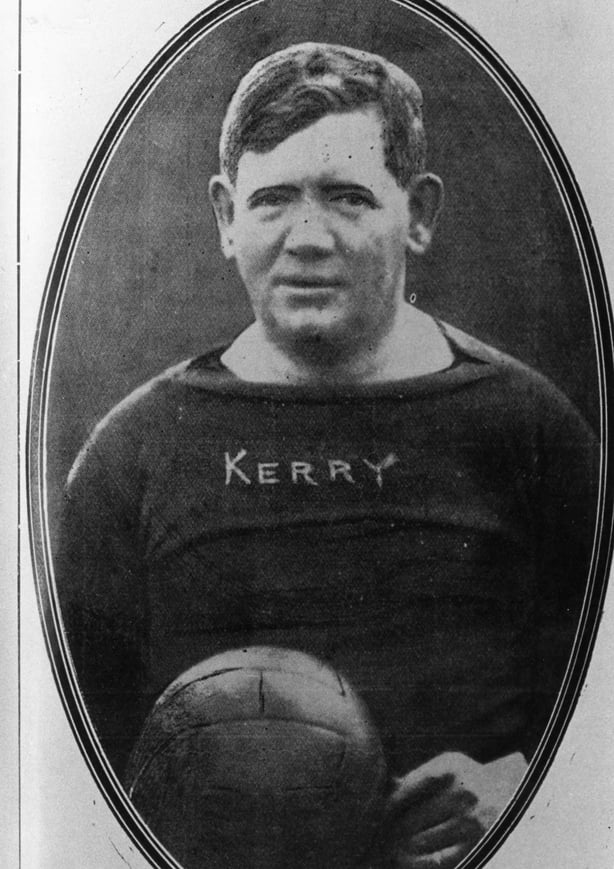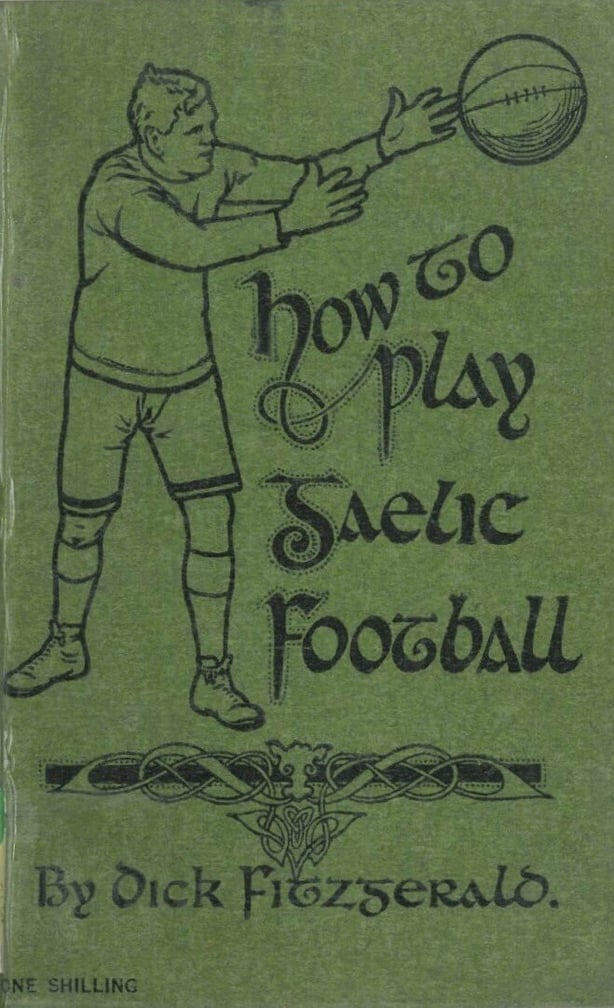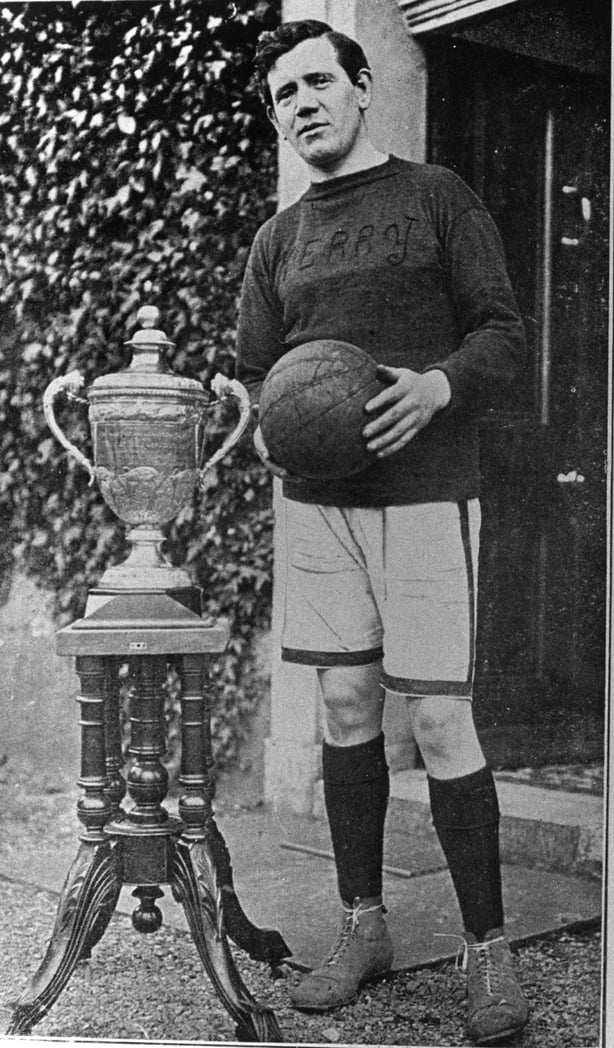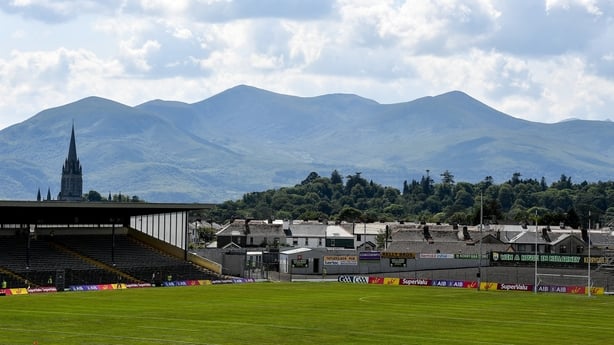He was the 1916 and War of Independence veteran who organised Gaelic football matches behind bars and wrote a celebrated book about how to play the game. In this extract from the Dictionary of Irish Biography's new book Irish Sporting Lives, Marie Coleman tells the story of Dick Fitzgerald
Dick (Richard) Fitzgerald was born 2 October 1882 in College Street, Killarney, Co. Kerry, one of at least three sons and three daughters of Michael Fitzgerald, a merchant of College Street, and his wife Bridget (née Healy). His primary education was with the Presentation Brothers in Killarney, his secondary successively with St. Brendan's, Killarney; Mungret College, Limerick; and the Presentation Brothers in Cork city. He would eventually take on the family business, earning his livelihood from trading butter, poultry and eggs.
His Gaelic football career began with the Nils club in Cork city before he returned to Killarney to play for Dr Crokes. Mainly a centre-half-forward, though also appearing in other forward positions, he was one of the earliest stars of Gaelic football. Considered the best player of his generation, he was an exceptionally talented and accurate scorer, a good distributor of the ball, and possessed of a wide range of skills, including difficult overhead kicking. He did not figure on any teams of the century or millennium, because he played so long ago.
The beginnings of a champion
He won the first of his five all-Ireland senior football championship medals with Kerry in the 1903 championship (played in 1905), Kerry’s first ever all-Ireland football title, after an epic three-match encounter with Kildare that raised the profile of Gaelic football nationally. The first game was abandoned after a pitch invasion when the referee deemed that the Kildare goalkeeper had carried the ball over the goal-line while attempting to clear a free taken by Fitzgerald. The replay resulted in a draw (Kerry 0–7, Kildare 1–4), and Kerry finally triumphed in the third game by 0–8 to 0–2 with Fitzgerald the star of the game.

He won four more all-Ireland championships with Kerry (1904, 1909, 1913, 1914), captaining the side and peaking as a footballer on the last two occasions. Furthermore, he was on the losing side in the all-Ireland finals of 1905, 1908 and 1915 (as captain); and was due to have played in the 1910 final but, because of a dispute between Kerry and the Great Southern Railway, Kerry refused to travel, and Louth was awarded a walkover. Between 1903 and 1916 he played fifty-eight senior inter-county championship matches, placing him fourth on the list of all-time Kerry championship appearances as late as 2008.
With Dr Crokes, he won four Kerry senior championship medals (1901, 1912–14) at a time of intense rivalry between Dr Crokes and the Tralee Mitchels club. During an encounter between the two sides in March 1911, he led his team off the pitch over a disputed decision. The authorities banned Dr Crokes for six months, rendering its players ineligible for the Kerry team for the duration. Fitzgerald would have returned for the 1911 all-Ireland final, but a weakened Kerry surprisingly lost in the Munster final.
Bestseller
In 1914 he published a book entitled How to play Gaelic football, in which he portrayed Gaelic football as a scientific game, superior to soccer and rugby. It included detailed descriptions of every position and the duties attached to them, photographs illustrating the principal skills, discussions on the roles of team captain and referee, and a fascinating account of how to play with thirteen-a-side teams, which he thought might happen in the future.

The book also espouses his preference for attacking rather than defensive football and his fear of professionalism creeping into the game, which led him to condemn training camps for teams. It was still being read by aspiring young Gaelic footballers into the mid-twentieth century.
From the 1910s he was active in the GAA as a match official, coach, selector and administrator. He coached the Clare team that reached the 1917 all-Ireland football final. In the 1920s he coached Dr Crokes and served as a member of the Kerry county board, the vice-chairman of the county selection committee, and a Kerry representative on the Munster and central councils; he was team manager for Kerry’s 1927 American tour.

In 1924 he supported unsuccessful attempts to remove the ban that prohibited GAA members from playing soccer, rugby, hockey and cricket. He was involved in a controversial incident in the 1925 all-Ireland football semi-final between Cavan and Kerry; Kerry won by one point after Fitzgerald, acting as umpire, signalled a point for Kerry that the Cavan players believed to be wide. Both teams were subsequently ejected from the competition.
Political activities
He joined the Killarney company of the Irish Volunteers in 1913 and influenced its decision to declare for the McNeillite Volunteers in 1915. He was second lieutenant of the company. In 1916 he was arrested after the Easter rising and interned in Frongoch, where he organised Gaelic football matches until his release on 2 August 1916. Rearrested on 22 September and returned to Frongoch, he was released for good towards the year's end.
We need your consent to load this rte-player contentWe use rte-player to manage extra content that can set cookies on your device and collect data about your activity. Please review their details and accept them to load the content.Manage Preferences
An active organiser for Sinn Féin in the Kerry East constituency from 1918, he was elected to Killarney urban district council for Sinn Féin in 1920. Local lore maintains that he drew upon his national network of Gaelic Athletic Association (GAA) connections to play an important role in organising safe houses for Michael Collins. In the last months of the War of Independence (1919–21), he went on the run as a member of the local flying column.
A supporter of the Anglo–Irish treaty (1922), he served as a Cumann na nGaedheal member of Killarney urban district council (east ward) from June 1925 until his death. Latterly he was described as being disillusioned with politics.

In 1925 he married Catherine Dillon, of Kenmare Place, Killarney; she was the sister of his former teammate Paddy Dillon. They had no children, and her death in 1927 hit him hard. Dick Fitzgerald died 26 September 1930 after a fall from a roof in Killarney. An inquest jury found that he died 'from shock and haemorrhage due to internal injuries to abdomen and chest by a fall from some height’ (Kerryman, 4 October 1930). Witnesses stated that he was coming down from the roof when he slipped and fell. He was buried in the New Cemetery, just outside Killarney. Two days after his death, Kerry reluctantly contested the all-Ireland football final, which they won; the match at Croke Park was preceded by the playing of Chopin’s ‘Funeral march’ by the Artane Boys’ Band. In 1935 the new GAA stadium in Killarney was named Fitzgerald Stadium in his honour.
Irish Sporting Lives brings to life sixty figures who in their individual ways illustrate the drama and diversity of Irish sporting history. Spanning 200 years, the biographical essays in Irish Sporting Lives incluide trailblazing women as well as serial winners and glorious losers, heroes and villains, role models and rogues, enduring legends and forgotten or overlooked greats.
Irish Sporting Lives is available now from all good bookshops and can be ordered here at www.ria.ie/isl
The sixty lives included in Irish Sporting Lives are drawn from Ireland's national biographical dictionary, the Dictionary of Irish Biography. Find out more at www.dib.ie
Sources: National Library of Ireland, Piaras Béaslaí papers; Dick Fitzgerald, How to play Gaelic football (1914); Kerryman, 4 October 1930; P. D. Mehigan (‘Carbery’), Gaelic football (1941); Patrick Foley, Kerry’s football story (1945); Raymond Smith, The football immortals (1968); Seán O’Mahony, Frongoch (1987); Killarney urban district council, local election results, 1899–1994 (1999); Jack Mahon, A history of Gaelic football (2000); T. Ryle Dwyer, Tans, terror and troubles: Kerry’s real fighting story, 1913–23 (2001); Joe Ó Muircheartaigh and T. J. Flynn, Princes of pigskin: a century of Kerry footballers (2007); Tom Looney, Dick Fitzgerald: king in a kingdom of kings (2008); Richard McElligott, Forging a kingdom: the GAA in Kerry 1884–1934 (2013); information from Sean Moran of The Irish Times
















































